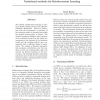113 search results - page 7 / 23 » Model Approximation for HEXQ Hierarchical Reinforcement Lear... |
JMLR
2010
13 years 2 months ago
2010
We consider reinforcement learning as solving a Markov decision process with unknown transition distribution. Based on interaction with the environment, an estimate of the transit...
ATAL
2008
Springer
13 years 9 months ago
2008
Springer
The problem of coalition formation when agents are uncertain about the types or capabilities of their potential partners is a critical one. In [3] a Bayesian reinforcement learnin...
ICML
2007
IEEE
14 years 8 months ago
2007
IEEE
Reinforcement learning algorithms can become unstable when combined with linear function approximation. Algorithms that minimize the mean-square Bellman error are guaranteed to co...
NIPS
1996
13 years 9 months ago
1996
Dynamic Programming, Q-learning and other discrete Markov Decision Process solvers can be applied to continuous d-dimensional state-spaces by quantizing the state space into an arr...
WSC
2008
13 years 10 months ago
2008
Reinforcement Learning (RL) is a simulation-based technique useful in solving Markov decision processes if their transition probabilities are not easily obtainable or if the probl...

